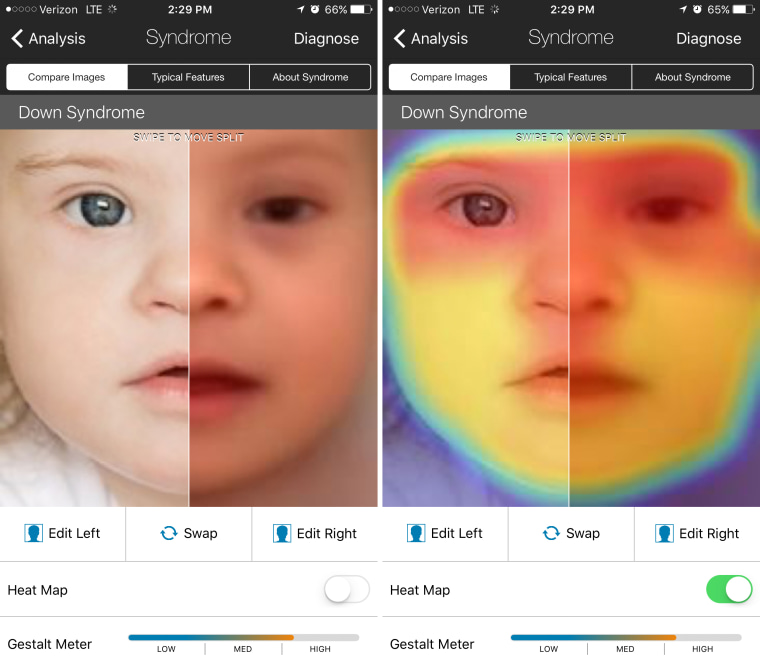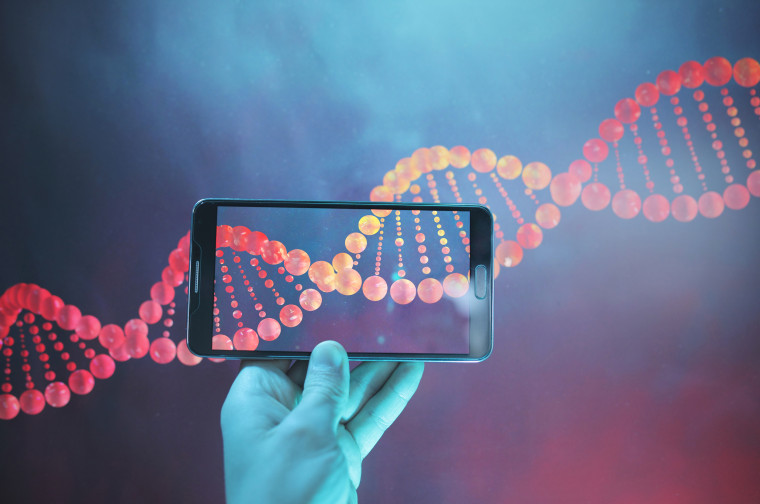Well before the family came in to the Batson Children’s Specialty Clinic in Jackson, Mississippi, they knew something was wrong. Their child was born with multiple birth defects, and didn’t look like any of its kin. A couple of tests for genetic syndromes came back negative, but Omar Abdul-Rahman, Chief of Medical Genetics at the University of Mississippi, had a strong hunch that the child had Mowat-Wilson syndrome, a rare disease associated with challenging life-long symptoms like speech impediments and seizures.
So he pulled out one of his most prized physicians’ tools: his cell phone.
Using an app called Face2Gene, Abdul-Rahman snapped a quick photo of the child’s face. Within a matter of seconds, the app generated a list of potential diagnoses — and corroborated his hunch. “Sure enough, Mowat-Wilson syndrome came up on the list,” Abdul-Rahman recalls.
Related: How Computers are Learning to Predict the Future
Abdul-Rahman is a member of Face2Gene’s scientific advisory board, and he’s one of the many physicians and researchers working with its developers to identify syndromes and diseases using facial recognition software. Like many of the 7,000 known rare diseases out there, Mowat-Wilson syndrome has a specific facial signature: square face, pointed chin, widely set eyes. Face2Gene’s algorithms map points on a patient’s face, compare those points with a database containing points from thousands of other faces, and suggest potential diagnoses.

Doing this all with a single photo is a neat trick, but the real power of the app lies in its long-term potential. Face2Gene’s system uses a machine-learning algorithm, meaning it learns from every new face it scans. The more data it acquires through its use, scientists hope, the more accurate the diagnoses.
This is the latest medical technology that leverages the power of big data to make better diagnoses and more accurate predictions; other artificial intelligence systems analyze patient symptoms or medical scans to predict cancers and crunch numbers to provide personalized treatments. Early diagnosis of rare diseases can help families seek specialized treatments, yet families often wait years for test results and referrals to specialists. That’s because the facial signatures of some rare diseases can be subtle and difficult to diagnose, even for a trained professional.
Related: Is Perfecting Artificial Intelligence This Generations Space Race?
Most experienced physicians have only seen a handful of patients with a specific rare disease — hardly enough to notice distinct patterns. “Only when you have hundreds or thousands of patients can you really say there’s a pattern,” FDNA CEO Dekel Gelbman says. “That’s where the computer power comes in.”
Face2Gene is publicly available, but there’s still a lot to learn, so its developers recommend only experts use it. When you download the app via the iTunes store, you’re asked to certify your credentials as a healthcare professional before you complete signing up. The technology is meant to be a tool to help identify diseases and syndromes; as a result, Face2Gene isn’t yet great at recognizing the faces of typically developing children.
“If you take a picture of a normal individual, it will still try to match them to the closest possible syndrome,” Abdul-Rahman says. “If you’re inexperienced and you use it on a random individual, it will suggest a diagnosis anyway.”
Face2Gene’s predictions could lead an inexperienced user to false positives; it takes an experienced professional to take the app’s suggestions and interpret them in the context of other clinical symptoms, or to order genetic tests.
Still, it could help a wider range of medical professionals make diagnoses. Pediatricians, nurse practioners, and physicians’ assistants may all see patients with genetic disorders, and Face2Gene could help those professionals screen children, says Rich Dineen, genetic counselor at the University of Illinois at Chicago. Dineen has not yet used the app himself, so he’s skeptical it will replace years of medical experience — but he’s hopeful it will help the field. “Any sort of technology we can use to make our job easier is a great thing,” he says.
Related: How the Tech Industry is Tackling the Cancer Moonshot
The technology certainly helped Abdul-Rahman and his patient. After getting Face2Gene’s opinion, he sent in an order for a genetic test, which verified the child’s diagnosis: Mowat-Wilson syndrome. That put an end to the family’s long search for a formal diagnosis, he says. “When the test came back, they were elated to finally have an answer.”
For more of the breakthroughs changing our lives, follow NBC MACH.
